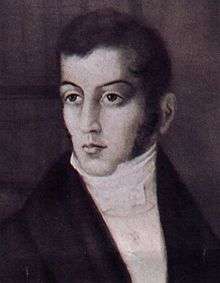Second Triumvirate (Argentina)
| Second Triumvirate Segundo Triumvirato | |
|---|---|
| United Provinces of the Río de la Plata | |
| Type | |
| Type | |
| History | |
| Established | 1812 |
| Disbanded | 1814 |
| Preceded by | First Triumvirate |
| Succeeded by | Supreme Director of the United Provinces of the Río de la Plata |
| Seats | 3 |
| Footnotes | |
|
See also: Asamblea del Año XIII | |
The Second Triumvirate (Spanish: Segundo Triunvirato) was the governing body of the United Provinces of the Río de la Plata (present day Argentina) that followed the First Triumvirate in 1812, shortly after the May Revolution, and lasted 2 years.
History
The second triumvirate is the result of the Revolution of October 8, 1812, when the generals José de San Martín and Carlos María de Alvear joined forces with former supporters of Mariano Moreno and deposed the First Triumvirate. When the members of the First Triumvirate were deposed, the Cabildo appointed new ones. Nicolás Rodríguez Peña was appointed by 172 votes against 12, Antonio Álvarez Jonte by 147 against 35, and Juan José Paso by 96 against 87. The new triumvirate called the Assembly of Year XIII, a popular request that the First Triumvirate avoided to follow.[1] The Triumvirate started its functions on October 8, 1812.
The second triumvirate took measures against the members of the former ones. Pueyrredón was vanished to San Luis, and Rivadavia was imprisoned and trialed. Chiclana was trialed, but found innocent, and then appointed as governor of Salta. Sarratea, under protection of the British diplomacy, did not face any reprisals.[2]
The main actions of the Triumvirate were:
- Established a commission on December 4, 1812 for the creation of the Constitution of Argentina
- Called for the Asamblea del Año XIII on January 31, 1813.
- Disposed the creation of the Province of Cuyo (present provinces of Mendoza, San Juan and San Luis) on November 14, 1813.
As the 1813 Assembly decided to replace the Triumvirate for a unipersonal Supreme Directorship, it ceased its functions on January 22, 1814, and Gervasio Antonio de Posadas assumed as the first Supreme Director of the United Provinces of the Río de la Plata. One year later, on January 31, 1815, he was to be replaced in office by his nephew Carlos María de Alvear, who counted on the support of the powerful Logia Lautaro.
Members
References
Bibliography
- Segreti, Carlos (1980). La aurora de la Independencia. Memorial de la Patria. (in Spanish). Tomo II. Buenos Aires: Editorial La Bastilla.
- Ternavasio, Marcela (2007). Gobernar la Revolución (in Spanish). Buenos Aires: Editorial Siglo Veintiuno.
- Galasso, Norberto (2009). Seamos Libres y lo demás no importa nada. Buenos Aires: Colihue. ISBN 978-950-581-779-5.


